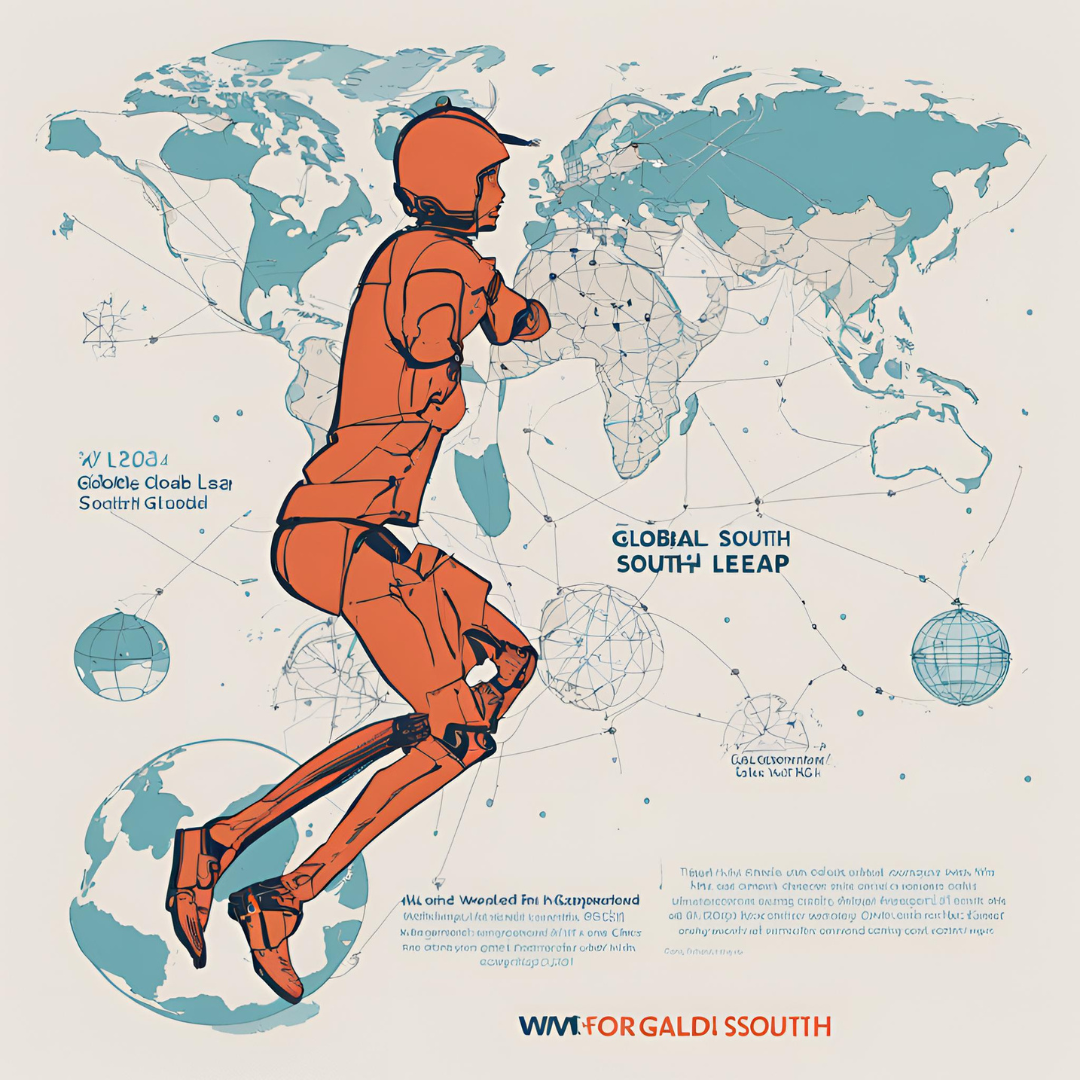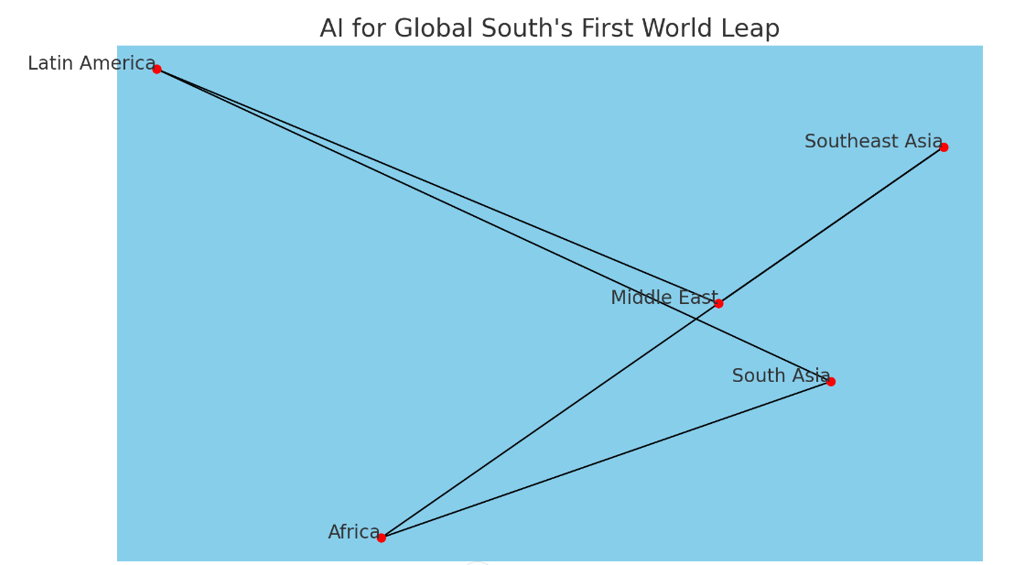AI for Global South's First World Leap
GLOBAL GOVERNANCE
6/15/20244 min read


Future of Technology Desk


Artificial Intelligence (AI) has emerged as a transformative force, promising significant advancements across various sectors including healthcare, education, agriculture, and more. Despite its potential to contribute up to $15.7 trillion to the global economy by 2030, the benefits of AI are unevenly distributed, with the Global North reaping the lion's share. The Global South faces structural and infrastructural barriers that limit its ability to harness AI's full potential. Yet, despite these challenges, AI can act as a powerful equalizer if strategically leveraged.
Structural and Infrastructural Challenges
The primary obstacle in the Global South's adoption of AI is the lack of essential infrastructure. High-capacity computing resources, expansive storage, robust network infrastructure, and advanced cybersecurity are fundamental for deploying AI at scale. The costs associated with these technologies are prohibitive for many resource-constrained countries. For instance, training sophisticated AI algorithms can run into millions of dollars, a figure out of reach for many developing nations.
Moreover, the availability of local data is critical for training AI models that are relevant and effective in specific contexts. However, many regions in the Global South suffer from inadequate data infrastructure, which hampers the ability to collect, store, and analyze large datasets. This data scarcity is exacerbated by the dominance of Western entities in data control and AI research, which often results in models that do not account for the socio-cultural nuances of the Global South.
The Power of AI as a Leveller
Despite these challenges, the intrinsic nature of AI technology holds the promise of leveling the playing field. Here are key ways through which AI can become a transformative tool for the Global South:
Frugal Innovation and Local Solutions:
Bangladesh provides a compelling example of how frugal innovation can bridge the AI divide. During the COVID-19 pandemic, Bangladesh repurposed its national helpline to gather self-reported symptoms from citizens, feeding this data into an AI algorithm to manage the disease. This approach, which bypassed the need for extensive PCR lab infrastructure, exemplifies how AI can enable developing countries to leapfrog traditional technological stages.
Open Source and Collaborative Platforms:
The rise of open-source AI models and platforms can democratize access to advanced AI technologies. By promoting open resources and collaborative frameworks, countries in the Global South can build upon existing models, tailoring them to local needs without bearing the full cost of development. Initiatives like Microsoft's Africa Development Center are pivotal in developing local talent and fostering AI ecosystems that are sustainable and contextually relevant.
International Cooperation and Investment:
Strategic investments and international cooperation are essential to overcoming structural barriers. International aid organizations and local governments need to invest in foundational AI infrastructure and capacity building. Programs such as AIForAll in India and various innovation hubs across Africa, Latin America, and Asia funded by entities like IDRC and FCDO, are already making strides by supporting localized AI solutions that address specific regional challenges, such as maternal health and education.
Ethical and Inclusive AI Development:
Ensuring that AI is developed ethically and inclusively is crucial for its equitable impact. Innovation hubs in the Global South are focusing on ethical AI in areas like sexual and reproductive health, demonstrating that responsible AI can address deeply entrenched health disparities. These projects emphasize the need for AI solutions to be transparent, inclusive, and reflective of local social realities.
Policy and Governance:
Robust AI governance frameworks are needed to safeguard against the risks of AI, such as data privacy concerns and algorithmic bias. The development of local policies and guidelines can ensure that AI technologies are implemented responsibly and sustainably. Engagement with global platforms, like the World Economic Forum’s National AI Strategy Peer Network, can help policymakers in the Global South learn from global best practices while tailoring strategies to their unique contexts.
IMAGE: CANVA
Who We Are:
The Economic Nations champions global unity through economic collaboration, focusing on sustainable growth, reducing inequalities, and enhancing global relationships for mutual prosperity and peace.
Leadership and Vision
Prominent leaders in the Global South are playing crucial roles in driving AI adoption and innovation. For instance, Indian Prime Minister Narendra Modi has championed the AIForAll initiative, which aims to democratize access to AI and integrate it into various sectors such as agriculture, healthcare, and education. Modi's vision emphasizes the importance of AI in solving local problems and fostering inclusive growth. Under his leadership, India is making significant investments in AI research and development, focusing on building robust infrastructure and nurturing a skilled workforce.
Moving Forward: A Collaborative Future
To truly harness AI's potential as a great power leveller, it is imperative that the voices of the Global South are amplified in global AI governance discussions. Ensuring equitable access to AI technologies and data is not just a matter of technology transfer but also involves building the capacity to use and adapt these technologies effectively.
Collaboration between policymakers, technology providers, and development communities is essential. By identifying local gaps, prioritizing needs, and co-designing solutions, a future-ready AI ecosystem can be established in the Global South. This collaborative approach will enable countries to not only catch up but also contribute meaningfully to the global AI landscape.
In conclusion, while the control of data and AI development by the Global North presents significant challenges, the inherent potential of AI as a transformative technology offers a unique opportunity for the Global South to leapfrog developmental stages and achieve greater economic and social parity. Strategic investments, international cooperation, ethical development, and robust governance are key to unlocking this potential and bridging the AI divide.
Contacts
enquiry@economicnations.org
(xx) 98-11-937-xxx (On verification)
